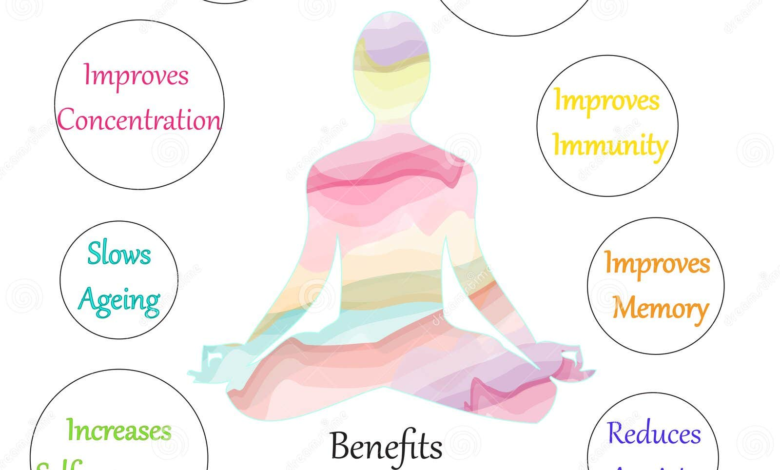Meditation Benefits: Slow Aging and Reduce Stress Naturally

Meditation benefits are increasingly being recognized in both scientific studies and personal testimonials, highlighting significant improvements in mental and physical health. One of the standout advantages is the remarkable ability of meditation to reduce stress, which has been linked to numerous chronic health issues. In addition, research into anti-aging meditation suggests that engaging consistently in practices like transcendental meditation can positively influence gene expression related to inflammation and cognitive function. For those seeking longevity, the practice of meditation has shown a promising association with healthier aging, providing a way to cultivate resilience against life’s stressors. By adopting a meditative routine, individuals can not only enhance their mental clarity but also potentially extend their lifespan through mindful living.
The practice of mindfulness and deep relaxation techniques offers a multitude of advantages, especially in today’s fast-paced world. Engaging in techniques such as transcendental meditation helps alleviate emotional burdens and improve one’s capacity for dealing with stress. Many individuals find that these practices improve not only their emotional well-being but also bolster their cognitive abilities over time. Furthermore, by exploring forms of meditation focused on longevity, practitioners can cultivate a more balanced and peaceful existence. Thus, the journey towards emotional and healthy resilience through meditative practices can be a transformative experience.
The Benefits of Meditation for Stress Reduction
Meditation is widely recognized for its powerful impact on stress reduction. Engaging in regular meditation practices helps practitioners detach from the stressful triggers of daily life, leading to a notable decrease in cortisol levels—the hormone associated with stress. By fostering a deep state of relaxation, individuals can cultivate a calm mental and emotional state, which in turn promotes greater resilience against future stresses. This is particularly significant as chronic stress is linked to various health issues, underscoring the importance of finding effective coping mechanisms such as meditation.
Research has demonstrated that techniques like transcendental meditation can lead to substantial improvements in stress management. Participants who engage in meditation often report feeling a greater sense of peace and clarity, enabling them to navigate life’s challenges with a more focused mindset. Additionally, the long-term practice of meditation can lead to changes in gene expression related to inflammation, emphasizing its role not only in managing stress but also in promoting overall well-being.
Meditation and Cognitive Function Enhancement
Numerous studies indicate that meditation can significantly enhance cognitive function. This is particularly evident in older adults who practice meditation, who often demonstrate improved memory, faster processing speeds, and a higher capacity for information retention. Cognitive performance measures, such as the Brain Integration Scale (BIS), have shown that long-term meditators score comparably to younger individuals, suggesting that meditation may help counteract age-related cognitive decline.
By engaging in meditation, practitioners can tap into mental clarity and sharper focus, which are essential for both personal and professional success. Meditation not only helps clear the mind but also strengthens neural pathways, thereby enhancing critical thinking and problem-solving abilities. These cognitive benefits contribute to the overall quality of life, as individuals become better equipped to handle complex tasks and make informed decisions.
Aging Gracefully: The Anti-Aging Benefits of Meditation
Meditation has been linked to anti-aging effects, offering a natural means to maintain youthfulness both physically and mentally. As shown in recent studies, consistent meditation practice can lower the expression of age-related genes, effectively slowing the biological markers associated with aging. This presents a compelling case for incorporating meditation into a holistic approach to longevity, wherein practitioners can enjoy enhanced well-being alongside reduced signs of aging.
In addition to its genetic benefits, meditation also promotes a healthier lifestyle by reducing stress and fostering emotional stability. As stress is a known contributor to premature aging, meditation serves as a valuable tool in combating its detrimental effects. The habits formed through regular meditation can lead to improved health choices, thereby reinforcing the cycle of longevity and vitality.
Meditation’s Role in Promoting Longevity
Many studies have pointed towards the connection between meditation practices and increased longevity. By engaging in methods like transcendental meditation, individuals often experience lower levels of stress and anxiety, which directly correlates to improved health outcomes over time. These practices can activate visceral relaxation responses, enhancing the body’s natural regenerative capacities, and contributing to a longer, healthier life.
The findings suggest that meditation not only promotes a healthy lifestyle but may also alter the body’s response to environmental stressors. Reduced cortisol levels among practitioners imply enhanced resilience, suggesting that those who meditate regularly may have a superior ability to withstand the physical and mental challenges that arise with aging.
Exploring Transcendental Meditation and Its Effects
Transcendental meditation (TM) is a well-researched technique known for its profound benefits on mental health and cognitive performance. Participants typically engage in this practice by silently repeating a mantra to achieve a deep state of relaxation. Studies have shown that TM can produce significant reductions in stress-related symptoms while enhancing overall mental clarity, making it a valuable option for those seeking a deeper understanding of meditation’s impact on the mind.
Recent research has highlighted TM’s potential to reverse the stress-induced aging process. By lowering inflammation and fostering healthier gene expression, individuals practicing TM can not only mitigate the psychological impacts of stress but also promote physical well-being in a sustainable manner. The harmony between mental and physical health, facilitated by TM, further underscores the importance of holistic approaches in achieving lifelong health.
The Impact of Meditation on Emotional Resilience
Meditation is instrumental in building emotional resilience, allowing individuals to navigate life’s ups and downs with greater ease. As practitioners familiarize themselves with mindfulness techniques, they develop the ability to observe their thoughts and emotions without attachment, fostering a deeper understanding of their inner workings. This enhanced self-awareness leads to improved emotional regulation and the capacity to respond to stressors in a more composed manner.
Furthermore, regular meditation cultivates a space for self-compassion and kindness, ultimately transforming how individuals perceive challenges. By equipping themselves with these emotional tools, meditators can enhance their quality of life while reducing the negative mental health risks associated with chronic stress and anxiety.
Harnessing Meditation for Better Health Outcomes
The health benefits of meditation extend beyond mental clarity and stress reduction; they also encompass a range of physical health improvements. Practitioners frequently notice enhancements in sleep quality, lower blood pressure, and improved immune function as a result of consistent meditation. These benefits hint at a remarkable synergy between mental and physical health, reinforcing the notion that caring for the mind also positively influences the body.
Furthermore, meditation can serve as a complementary therapy alongside traditional health practices. By integrating meditation into one’s wellness routine, individuals may better manage chronic conditions and enhance their overall health trajectory. This holistic approach to health care emphasizes prevention and mindfulness, which can lead to a more balanced, fulfilling life.
Meditation Techniques to Explore for Health Benefits
Exploring various meditation techniques can help individuals find the right practice that resonates with them. For instance, body scan meditation focuses on breathing and carries awareness through different parts of the body, which can alleviate tension and enhance relaxation. This practice, particularly beneficial for those new to meditation, quickly calms the nervous system and sets the stage for deeper meditative experiences.
As individuals discover and experiment with diverse styles, from guided imagery to movement-based practices like yoga and qigong, they can personalize their meditation journey for optimal benefits. This customized approach encourages sustained engagement, leading to more pronounced physical and emotional health improvements over time.
Bridging Meditation and Personal Growth
Meditation serves as a powerful catalyst for personal growth, fostering a deeper connection between the self and the external world. Through regular practice, individuals can unlock deeper layers of understanding, enhancing their relationships and interactions. This journey into self-discovery not only enriches personal experiences but also contributes to a greater sense of purpose and direction.
As one delves into the introspective nature of meditation, they may uncover thoughts and beliefs that have held them back. Armed with this newfound awareness, individuals can make conscious choices that align with their values, leading to transformative shifts in their daily lives. This process exemplifies how meditation transcends its immediate benefits, propelling individuals towards fulfilling their potential.
Frequently Asked Questions
How does meditation reduce stress and promote overall well-being?
Meditation reduces stress by encouraging relaxation and mindfulness, which can lower cortisol levels, the hormone associated with stress. Engaging in regular meditation practice allows individuals to cultivate a calm state of mind, fostering resilience against stress and contributing to better mental health.
What are the anti-aging effects of meditation?
Meditation is linked to anti-aging benefits as studies suggest it can decrease the expression of age-related genes and inflammation. Regular practice of transcendental meditation has shown to support healthy aging by promoting resilience and reducing chronic stress, factors commonly associated with age-related diseases.
Can transcendental meditation improve cognitive function?
Yes, transcendental meditation has been shown to enhance cognitive function. Research indicates that practitioners, especially older individuals, experience improved processing speeds and higher scores in cognitive assessments. This suggests that meditation may help maintain mental sharpness and cognitive performance as one ages.
How does meditation relate to longevity?
Meditation contributes to longevity by enhancing emotional well-being, reducing stress, and improving physiological health markers. Regular meditation practice is associated with lower levels of cortisol, which can lead to reduced risk factors for age-related health issues, promoting a longer and healthier life.
What role does meditation play in reducing stress-related health issues?
Meditation plays a critical role in reducing stress-related health issues by promoting relaxation, improving hormonal balance, and enhancing emotional resilience. By lowering cortisol and other stress biomarkers, meditation can mitigate the long-lasting effects of stress, which are linked to various chronic diseases.
| Key Points | Details |
|---|---|
| Meditation’s Benefits | Meditation practices can slow aging, reduce stress, and promote cognitive health. |
| Study Overview | Research by MIU and other institutions indicates that transcendental meditation helps lower inflammation and aging-related gene expression. |
| Practical Outcomes | Long-term meditators showed cognitive performance comparable to younger individuals, with enhanced brain integration. |
| Cortisol Levels | Meditation reduces levels of cortisol, a stress hormone that can affect health as we age. |
| Expert Insights | Meditation is endorsed by biohacker Dave Asprey, highlighting its potential for improving health and longevity. |
| Common Misconceptions | Not all meditation techniques are equally effective for everyone; finding the right method is essential. |
Summary
Meditation benefits not only enhance mental well-being but also play a crucial role in slowing the aging process. As evidenced by recent research, engaging in regular meditation practices can significantly alleviate stress and promote healthier cognitive function. The consistent application of techniques like transcendental meditation provides long-term advantages, such as reduced inflammation and improved emotional resilience. Incorporating meditation into daily routines could lead to greater longevity and overall health, making it a valuable practice for anyone seeking to enhance their quality of life.




